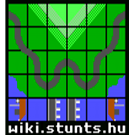Dual-way switching: Difference between revisions
No edit summary |
mNo edit summary |
||
| (8 intermediate revisions by the same user not shown) | |||
| Line 1: | Line 1: | ||
[[image:Siofok-dual-way-switching.png|320px|right|thumb|The Siófok dual-way switch, as seen in [http://youtu.be/FGn6j3BYg9g the video tutorial]. The arrow shows the shortcut, and the blue lines, the path boundaries. The car leaves one path through the top left tile of the u/d cork (thus meeting the requirement of crossing at least one element in the initial path), and enters the other path through the sharp corner tile.]] | |||
'''Dual-way switching''' is a kind of shortcut that exploits a programming oversight in Stunts' penalty time system. On tracks where the road splits, it is possible to leave one of the paths and re-enter the track through any point of the other one without [[penalty time]], provided at least one track element is crossed before the paths rejoin. Tracks with multiple paths usually either are designed in a way to prevent dual-way switching or explicitly exploit them to make alternative racing lines available. | |||
==Video== | |||
Some canonical examples of dual-way switching. First, [http://youtu.be/FGn6j3BYg9g a basic tutorial on Siófok] ([[USC]] 07/08). Then, [http://youtu.be/vePXr_9tJ1E a lap around X-change] ([[SDR|SDR-RH]] 2007) featuring several way switches. For a more extreme example, you can also check the [http://youtu.be/WWk-8QXwCG8 forbidden shortcut of ZCT127]. | |||
[[Category:Driving]] | [[Category:Driving]] | ||
Latest revision as of 14:58, 2 February 2025

Dual-way switching is a kind of shortcut that exploits a programming oversight in Stunts' penalty time system. On tracks where the road splits, it is possible to leave one of the paths and re-enter the track through any point of the other one without penalty time, provided at least one track element is crossed before the paths rejoin. Tracks with multiple paths usually either are designed in a way to prevent dual-way switching or explicitly exploit them to make alternative racing lines available.
Video
Some canonical examples of dual-way switching. First, a basic tutorial on Siófok (USC 07/08). Then, a lap around X-change (SDR-RH 2007) featuring several way switches. For a more extreme example, you can also check the forbidden shortcut of ZCT127.
